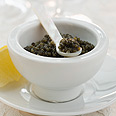
(Illustration)
צילום: index open
Israeli kibbutz takes bite out of Iran's caviar exports
Kibbutz Dan's exports of marine delicacy boom as trade sanctions, Caspian Sea fishing moratorium cripple one of Tehran's strongest export avenues
Kibbutz Dan in northern Israel has become a somewhat unlikely source for one the world's most exclusive marine delicacies – caviar.
The kibbutz' export venture is reportedly flourishing following the trade sanctions imposed on Iran – one of the world's leading caviar exporters – by the West.
According to the London Times, the fishing moratorium introduced around the Caspian Sea – mostly in an effort to protect the endangered wild beluga sturgeon – has also drastically reduced caviar production by the Islamic Republic.
Kibbutz Dan has directed its natural resource – mountain spring water – into a series of fish farming ponds. Originally stocked with trout and bream, the community decided to branch out into beluga sturgeon. Some 15 years later, business is booming.
"Seven years ago 95% of the caviar in the world came from the Caspian Sea and 5% from fish farms, and today the proportions are reversed: 90% comes from farms and 10% from nature," kibbutz member Yigal Ben Zvi said. .
In 2011, the kibbutz sold 3,000kg of caviar and its sales for 2012 are expected to top 4,000kg. The United States and Europe are its main markets; and at $468 for every 50g, the harvest is worth more than $32.3 million.
Some of the world's top chefs, including Jean François Bruel, Daniel Boulud and Eric Ripert, have hailed the Israeli caviar as some of the best in the world, praising its "clear taste," the report said.
Unfortunately, the precious delicacy cannot be sold in Israel as the sturgeon is not considered a kosher species under Jewish Halachic law.
"The rabbinical authorities have threatened that if we sell non-kosher fish or caviar in Israel they will take the kashrut (kosher) certificate away from the trout," Ben Tzvi said. "It’s simply blackmail."
Follow Ynetnews on Facebook and Twitter










